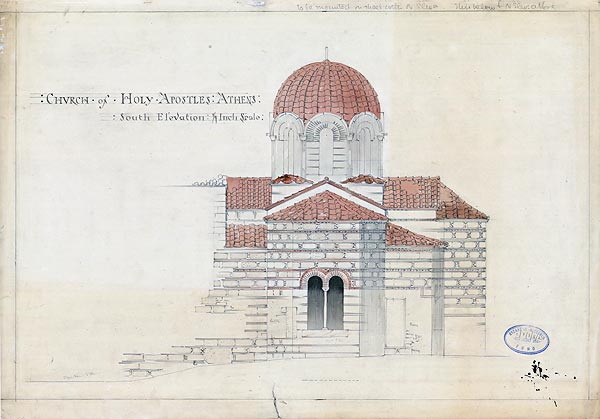About the BRF Collection

The Byzantine Research Fund Archive (BRF) is a unique collection of architectural drawings, photographs and notebooks created from the late 19th century to the middle of the 20th century by a small team of British architects trained in the Arts & Crafts tradition whose studies of Byzantium shaped the Byzantine Revival in later years.
The collection contains over 1,500 drawings and 1,000 photographs, numerous notebooks and the corporate records associated with the Byzantine Research and Publication Fund, the original body created in 1907 to support this work. Although the Fund was associated with the BSA from the time it was founded, it was not until 1937 that the BSA formerly took over the property and operation of it. The BRF Archive contains records of Byzantine monuments in Greece, Turkey, Italy, the Near East, Egypt, and Cyprus. In some cases, the collection contains the only record of a monument before its destruction in modern times, the most important example being the church of Hagios Demetrios in Thessalonike which was almost completely destroyed in the Great Fire of 1917 shortly after being recorded by one of the BRF architects, Walter Sykes George. It also contains personal records of the following architects; Robert Weir Schultz, Sidney Howard Barnsley, Walter Sykes George, William Harvey, Harold Swainson, Peter Gus Corbett, and A.H.S (Peter) Megaw. The aspirations of the BRF Archive Project today are to make these materials accessible to a wide range of researchers.
Cross section (lower part of the church). This is a preliminary drawing. It is annotated in pencil.
West elevation. This is a preliminary drawing. It is dated in pencil in the lower left-hand corner. It is annotated in pencil.
Upper part: First floor plan - Lower floor: Ground floor plan. The drawing is entitled in pencil: 'House no 1, Mistras'. It is labelled in pencil: 'Ground Floor Plan' and 'First Floor Plan'. Further annotation in pencil survives.
Upper part: First floor plan - Lower floor: Ground floor plan. The drawing is entitled in pencil: 'House no 1, Mistras'. It is labelled in pencil: 'Ground Floor Plan' and 'First Floor Plan'. Further annotation in pencil survives.
Cross section (left) - Longitudinal section (right). The drawing is entitled in pencil: 'House no1 Mistras'. It is labelled in pencil: 'Cross Section' - 'Long Section'. It is signed in pencil (W.George) in the upper right-hand corner. Further annotation in pencil survives.
Cross section (left) - Longitudinal section (right). The drawing is entitled in pencil: 'House no1 Mistras'. It is labelled in pencil: 'Cross Section' - 'Long Section'. Further annotation in pencil survives.
South elevation - East elevation - Cornelling (details). The drawing is entitled in pencil: 'House no 1 Mistras'. It is labelled in pencil: 'South Elevation', 'East Elevation', 'Details of Corbelling'. It is initialed in pencil (W.S.G) in the lower right-hand corner. Further annotation in pencil survives.
South elevation - East elevation - Cornelling (details). The drawing is entitled in pencil: 'House no 1 Mistras'. It is labelled in pencil: 'South Elevation', 'East Elevation', 'Details of Corbelling'. Further annotation in pencil survives. The drawing is annotated in two different handwritings in pencil on the reverse. It is signed: 'Houses at Mistras, W. S. George' and is dated: 'Drawings Mistras Houses from W.S. George 03/07/09' in a handwriting that strongly recalls that of R. Weir-Schultz. See: Corporate Records Letter from W.S.George to R.Weir-Schultz (July 1909).
Plans of the Three Storeys. The drawing is entitled in pencil: 'Mistras House no 2(of the Palaeologi)'. It is labelled in pencil: 'Lower Storey', 'Upper Storey' and 'Middle Storey'. It is signed in the upper right-hand corner (W. George) in pencil.
Plans of the three storeys. The drawing is entitled in pencil: 'Mistras House no 2(of the Palaeologi)'. It is labelled in pencil: 'Lower Storey', 'Upper Storey' and 'Middle Storey'. Further annotation in pencil survives.
From left to right: Longitudinal section - East elevation - North elevation. The drawing is entitled in pencil: 'Mistras House no 2(of the Palaeologi - Michael?)'. It is labelled in pencil: 'Long Section', 'East Elevation' and 'North Elevation'. It is signed in the upper right-hand corner (W. George) in pencil.
From left to right: Longitudinal section - East elevation - North elevation. The drawing is entitled in pencil: 'Mistras House no 2(of the Palaeologi - Michael?)'. It is labelled in pencil: 'Long Section', 'East Elevation' and 'North Elevation'.
Plans of the two storeys, South-east Elevation of the tower. The drawing is entitled in pencil: 'Mistras House no 3 Called 'Mamora' Probably because of a Roman Sarcophagus at the Base of Tower'. It is labelled in pencil: 'Upper Storey', 'S.E. Elevation', 'Lower Storey'. It is signed in pencil (W. George) in the lower right-hand corner.
Plans of the two storeys, South-east Elevation of the tower. The drawing is entitled in pencil: 'Mistras House no 3 Called 'Mamora' Probably because of a Roman Sarcophagus at the Base of Tower'. It is labelled in pencil: 'Upper Storey', 'S.E. Elevation', 'Lower Storey'.
Plan. The drawing is entitled in pencil: 'Mistras: Church of St Nicolas'. It is labelled in ink: 'A Plan of the Church'. It is numbered in pencil (no 1) in the upper right-hand corner. Further annotation in pencil survives.
Plan. This is a preliminary drawing. It is entitled in pencil: 'St Nikolas in Upper Town - Mistras'. Further annotation in pencil survives.
Relief panel (left) - East elevation (right, upper part), Plan (right, lower part). This is a preliminary drawing. It is entitled in pencil: 'Mistras-Church of St Nicholas'. It is numbered in pencil (no 2) in the upper right-hand corner. Futher annotation in pencil survives.
East elevation. This is a preliminary drawing. It is entitled in pencil: 'Mistras-Church of S. Nicolas'. Further annotation in pencil survives.
Longitudinal section. This is a preliminary drawing. It is entitled in pencil: 'S. Nicholas - Mistras'. Further annotation in pencil survives.
Rubbing- Sculpture (part of carved relief). The drawing was found in the Perivleptos rubbings folder.
Rubbing- Sculpture (part of carved relief). The drawing was found in the Perivleptos rubbings folder. It is annotated in red crayon: 'Mistras-Where I don't know'.
South façade. The drawing is annotated in ink. It has been misnumbered in pencil: 'Monemvasia 18'. On the back: Hellenic Society label with the note: 'Lakonia, Medieval Churches: H. Georgios Kitta from the S, BSA XV p. 189, fig. 3a, R. Traquair'.
Taxiarches, Areopolis (left): Detail of the vaulting - Hagios Nikolaos, Platza (right, on the top): North façade, Plan of the dome - Taxiarches (Hagioi Asomatoi), Kouloumi (right, at the bottom): Carved panels from the iconostasis. The drawing is labelled in ink: 'Sketches from Mani'. It is numbered in pencil: 'Plate III'. On the back: Hellenic Society label with the note: 'Lakonia, Medieval Churches: Sketches from Mani from the S, BSA XV p. 182, fig. 2, R. Traquair'. It has been misnumbered in pencil: 'Monemvasia 19'.
North-east view. The drawing is labelled in ink: 'Areopolis, Hagios Taxiarchos'. It is dated in ink (1909). On the back: Hellenic Society label with the note: 'Lakonia, Medieval Churches: H. Taxiarches, Areopolis, BSA XV p. 189, fig. 3b, R. Traquair'. The name of the church has been mispelled.
Hagia Sophia: Longitudinal section, plan - Hagioi Theodoroi: Plan. The drawing is entitled in ink: 'Hagia Sophia Koutiphari', 'Ruined Church near Hagios Theodoros Prasteion'. It is labelled in ink. On the back: Hellenic Society label with the note: 'Lakonia, Medieval Churches: H. Sophia at Koutiphari - H. Theodoros at Prasteion, BSA XV p. 195, fig. 5, R. Traquair'.
Asomatos, Kakovouno: Part of the iconostasis - Hagioi Theodoroi, Vamvaka: Window of south-east apse - Hagios Georgios, Kitta: Column - Hai-Strategos, Boularioi: Details of the iconostasis - Hagios Nikolaos, Ochia: Guilloche pattern from the west front. The drawing is entitled in ink: 'Lower Mani, Details'. It is annotated in ink. On the back: Hellenic Society label with the note: 'Lakonia, Medieval Churches: Churches of W. Mani: Details of Decoration, BSA XV pl. XVI, R. Traquair'. The drawing is misnumbered in pencil: 'Monemvasia 20'.
Plan. The drawing is entitled in ink: 'Church of S. Sophia Monemvasia'. It is labelled in ink: 'A Plan of the Church'.
Plan. This is a preliminary drawing. It is annotated in pencil: Monemvasia - St Sophia. Further annotation in pencil survives.
Longitudinal section. This is a preliminary drawing. It is annotated in pencil
Cross section. This is a preliminary drawing. It is annotated in pencil.
Plan. The drawing is entitled in ink:'Church of S. Sophia Monemvasia. It is labelled in ink: 'A Plan of the Church'.
Longitudinal section - Detail of carved frieze (cornice). The drawing is entitled in ink:'Church of S. Sophia Monemvasia. It is labelled in ink:'Section Looking North-West'.
Longitudinal section - Detail of carved frieze (cornice). This is a preliminary drawing. It is entitled in ink:'Church of S. Sophia Monemvasia. It is labelled in ink:'Section Looking North-West'. It is annotated in pencil.
Cross section. The drawing is entitled in ink:'Church of S. Sophia Monemvasia. It is labelled in ink:'Section Looking North-East'.
Cross section. This is a preliminary drawing. It is entitled in ink:'Church of S. Sophia Monemvasia. It is labelled in ink:'Section Looking North-East'. It is annotated in pencil.
South elevation (?). This is a preliminary drawing. It is entitled in ink:'Church of S. Sophia Monemvasia.
South elevation. This is a preliminary drawing. It is annotated in pencil.
Ground plan. This is a preliminary drawing. It is annotated in pencil.
Transverse section with iconography. This is a preliminary drawing.
Elevation of window (left) - Details of exterior decoration (narthex). This is a preliminary drawing. It is annotated in pencil.
Details of the sculpture decoration of the church. This is a preliminary drawing. It is annotated in pencil.
Closure slab from the templon. This is a preliminary drawing.
Enthroned Virgin with Christ child. This is a preliminary drawing. It is annotated in pencil.
Transverse section with iconography. The drawing is labelled in ink: 'Section Looking East'.It is entitled in pencil in the upper left-hand corner: 'Samari'. It is numbered (No 7) in pencil in the upper right-hand corner. The drawing was exhibited (no 508) in the 1936 Royal Academy exhibition.
West elevation. The drawing is labelled in ink: 'West Elevation'.It is entitled in pencil in the upper left-hand corner: 'Messenia Samari'. It is numbered (No 3) in pencil in the upper right-hand corner.Further annotation in pencil survives.
South elevation. The drawing is labelled in ink: 'South Elevation'.It is entitled in pencil in the upper left-hand corner: 'Messenia Samari'. It is numbered (No 4) in pencil in the upper right-hand corner. This drawing was part of the 1936 Exbhitiion at the Royal Academy and was panel 509 in the catalogue
East elevation. The drawing is labelled in ink: 'East Elevation'.It is entitled in pencil in the upper left-hand corner: 'Samari'. It is numbered (No 5) in pencil in the upper right-hand corner. Further annotation in pencil survives.
North elevation. The drawing is labelled in ink: 'North Elevation'.It is entitled in pencil in the upper left-hand corner: 'Samari'. It is numbered (No 6) in pencil in the upper right-hand corner. Further annotation in pencil survives.
Pointed arch part of elevation (?). This is a preliminary drawing. It is labelled in pencil (S. George Androusa ?) in the upper right-hand corner.
East elevation. This is a preliminary drawing. It is entitled in pencil: 'Church of S. George Androusa, East End, 1/2 Scale).


